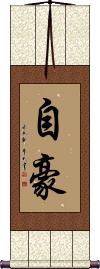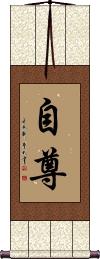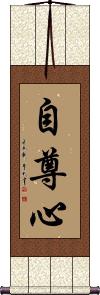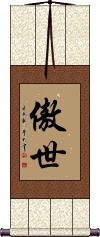Many custom options...
And formats...

Pride in Chinese / Japanese...
Buy a Pride calligraphy wall scroll here!
Personalize your custom “Pride” project by clicking the button next to your favorite “Pride” title below...
Pride
Pride
自尊 can mean “pride,” “self-respect,” or “self-esteem.” The first character means “oneself,” and the second can mean revered, valuable, precious, noble, exalted, honorable, or simply “pride.”
I have also seen this two-character word translated as “amour propre,” self-regard, and self-pride.
自尊 is universal between Chinese, Japanese Kanji, and Korean Hanja written languages. It may also be understood in old Vietnamese (they once used Chinese characters as well).
Prideful Mind / Self-Respecting Heart
自尊心 is a Japanese and Korean word that means “pride” or “self-respect.”
The first Kanji/Hanja means oneself. The second can mean revered, valuable, precious, noble, or exalted. And the last Kanji/Hanja means heart, mind, and/or spirit.
While these characters make sense and hold the same general meaning in Chinese, this is not a normal Chinese word. This selection should only be used if your audience is Japanese or Korean.
See Also: Respect | Pride | Self-Reliance | Self-Control | Self-Discipline
Pride Goes Before a Fall
This literally means an arrogant army is bound to lose.
The meaning is similar to “pride goes before a fall.”
Others may translate this as “defeat is inevitable for an overconfident army,” “being arrogant and overconfident inevitably leads to defeat,” or “pride comes before a fall.”
Proud / Pride / Lofty-Minded
傲世 is a word used to describe someone that is very proud and holds themselves above others but with a valid (earned) reason to do so.
傲世 is what you would use to describe the way a mighty general of ancient China like Cao Cao acted or a more modern person like General Patton carried himself.
If you hang this word on your wall, it suggests that you hope to achieve that same level of pride from accomplishment.
Self-Respect / Self-Esteem
自尊 means self-respect or self-esteem in Chinese, Korean and Japanese. It can also mean “pride in oneself.”
Note: Japanese sometimes put the character for the heart after these two. However, this two-character word is universal between all three languages (which is often better since more than a third of the world's population can read this version as a native word).
Not the results for Pride that you were looking for?
Below are some entries from our dictionary that may match your Pride search...
| Characters If shown, 2nd row is Simp. Chinese |
Pronunciation Romanization |
Simple Dictionary Definition |
十法 see styles |
shí fǎ shi2 fa3 shih fa jippō |
More info & calligraphy: Ten perfect Mahayana rules |
我慢 see styles |
wǒ màn wo3 man4 wo man gaman(p); gaman がまん(P); ガマン |
More info & calligraphy: Gamanabhimāna, ātma-mada. Egoism exalting self and depreciating others; self-intoxication, pride. |
自尊 see styles |
zì zūn zi4 zun1 tzu tsun jison じそん |
More info & calligraphy: Prideself-respect; esteem; self-importance; pride |
自尊心 see styles |
zì zūn xīn zi4 zun1 xin1 tzu tsun hsin jisonshin じそんしん |
More info & calligraphy: Prideful Mind / Self-Respecting Heartself-esteem; self-respect; self-importance; conceit; pride |
驕兵必敗 骄兵必败 see styles |
jiāo bīng bì bài jiao1 bing1 bi4 bai4 chiao ping pi pai kyouheihippai / kyohehippai きょうへいひっぱい |
More info & calligraphy: Pride Goes Before a Fall(expression) (yoji) defeat is inevitable for an overconfident army; being arrogant and overconfident inevitably leads to defeat; pride comes before a fall |
猿も木から落ちる see styles |
sarumokikaraochiru さるもきからおちる |
More info & calligraphy: Even Monkeys Fall From Trees |
使 see styles |
shǐ shi3 shih tsukasa つかさ |
to make; to cause; to enable; to use; to employ; to send; to instruct sb to do something; envoy; messenger (1) messenger; (2) (abbreviation) (See 検非違使) police and judicial chief (Heian and Kamakura periods); (3) {Buddh} (See 煩悩・2) klesha (polluting thoughts such as greed, hatred and delusion, which result in suffering); (female given name) Tsukasa To send; cause; a messenger; a pursuer, molester, lictor, disturber, troubler, intp. as 煩惱 kleśa, affliction, distress, worldly cares, vexations, and as consequent reincarnation. There are categories of 10, 16, 98, 112, and 128 such troublers, e. g. desire, hate, stupor, pride, doubt, erroneous views, etc., leading to painful results in future rebirths, for they are karma-messengers executing its purpose. Also 金剛童子 q. v. |
傲 see styles |
ào ao4 ao gō |
proud; arrogant; to despise; unyielding; to defy pride |
垢 see styles |
gòu gou4 kou ku く |
dirt; disgrace {Buddh} (See 煩悩・2) klesha (polluting thoughts such as greed, hatred and delusion, which result in suffering); (personal name) Yoshimi mala. Dust, impurity, dregs; moral impurity; mental impurity. Whatever misleads or deludes the mind; illusion; defilement; the six forms are vexation, malevolence, hatred, flattery, wild talk, pride; the seven are desire, false views, doubt, presumption, arrogance, inertia, and meanness. |
慢 see styles |
màn man4 man man |
slow māna. Pride, arrogance, self-conceit, looking down on others, supercilious, etc.; there are categories of seven and nine kinds of pride. |
七使 see styles |
qī shǐ qi1 shi3 ch`i shih chi shih shichishi |
The seven messengers, agents, or kleśas—desire 欲愛; anger, or hate 瞋恚; attachment, or clinging 有愛; pride or arrogance 慢; ignorance, or unenlightenment 無明; false views 見; and doubt 疑. |
七垢 see styles |
qī gòu qi1 gou4 ch`i kou chi kou shichiku |
The seven defilements―desire 欲, false views 見, doubt 疑, pride 慢, arrogance 憍 torpor 隨眠, and 慳 stinginess; cf. 七使. |
七慢 see styles |
qī màn qi1 man4 ch`i man chi man shichiman |
The seven pretensions or arrogances 慢 asserting superiority over inferiors and equality with equals, 過慢 superiority over equals and equality with superiors, 慢過慢 superiority over manifest superiors, 我慢 egotism or overweening pride, 增上慢 vaunting assertion of possessing the Truth, 卑慢 vaunting one's inferiority (or false humility), and 邪慢 vaunting lack of virtue for virtue. |
上慢 see styles |
shàng màn shang4 man4 shang man jōman |
pride in superior [spiritual] attainment |
九慢 see styles |
jiǔ màn jiu3 man4 chiu man kuman |
The nine forms of pride: that I surpass, am equal to, not so bad as others; that others surpass, are as bad as, are inferior to me; that none surpass, are equal to, or worse than me. |
九結 九结 see styles |
jiǔ jié jiu3 jie2 chiu chieh kyūketsu |
The nine bonds that bind men to mortality: love, hate, pride, ignorance, (wrong)views, possessions (or grasping), doubt, envy, meanness (or selfishness). They are the 六隨眠 plus grasping, envy, and meanness. |
五濁 五浊 see styles |
wǔ zhuó wu3 zhuo2 wu cho gotaku |
the five impurities (Buddhism) 五滓; 五渾 The five kaṣāya periods of turbidity, impurity, or chaos, i. e. of decay; they are accredited to the 住 kalpa, see 四劫, and commence when human life begins to decrease below 20,000 years. (1) 劫濁 the kalpa in decay, when it suffers deterioration and gives rise to the ensuing form; (2) 見濁 deterioration of view, egoism, etc., arising; (3) 煩惱濁 the passions and delusions of desire, anger, stupidity, pride, and doubt prevail; (4) 衆生濁 in consequence human miseries increase and happiness decreases; (5) 命濁 human life time gradually diminishes to ten years. The second and third are described as the 濁 itself and the fourth and fifth its results. |
五結 五结 see styles |
wǔ jié wu3 jie2 wu chieh goketsu |
Wujie or Wuchieh Township in Yilan County 宜蘭縣|宜兰县[Yi2 lan2 Xian4], Taiwan The five bonds to mortality: 貧 desire, 恚 hata, 慢 pride, 嫉 envy, 慳 grudging. |
傲人 see styles |
ào rén ao4 ren2 ao jen |
worthy of pride; impressive; enviable |
傲慢 see styles |
ào màn ao4 man4 ao man gōman ごうまん |
arrogant; haughty (noun or adjectival noun) pride; haughtiness; arrogance; insolence; hubris conceit |
傲自 see styles |
ào zì ao4 zi4 ao tzu |
pride; overbearing |
八慢 see styles |
bā màn ba1 man4 pa man hachiman |
The eight kinds of pride, māna, arrogance, or self-conceit, 如慢 though inferior, to think oneself equal to others (in religion); 慢慢 to think oneself superior among manifest superiors; 不如慢 to think oneself not so much inferior among manifest superiors; 增上慢 to think one has attained more than is the fact, or when it is not the fact; 我慢 self-superiority, or self-sufficiency; 邪慢 pride in false views, or doings; 憍慢 arrogance; 大慢 extreme arrogance. |
八憍 see styles |
bā jiāo ba1 jiao1 pa chiao hakkyō |
The eight kinds of pride, or arrogance, resulting in domineering: because of strength; of clan, or name; of wealth; of independence, or position; of years, or age; of cleverness, or wisdom; of good or charitable deeds; of good looks. Of these, eight birds are named as types: 鴟梟 two kinds of owl, eagle, vulture, crow, magpie, pigeon, wagtail. |
十使 see styles |
shí shǐ shi2 shi3 shih shih jū shi |
十大惑; 十根本煩惱 The ten messengers, deluders, fundamental passions; they are divided into five sharp and five dull; the five 鈍使 dull ones are desire, hate, stupidity, pride, and doubt; the five sharp 利使 are 身見, 邊見, 邪見, 見取見, 戒禁見, v. 見. |
十境 see styles |
shí jìng shi2 jing4 shih ching jikkyō |
Ten objects of or stages in meditation觀 in the Tiantai school, i.e. 陰境 the five skandhas; 煩惱境 life's distresses and delusion; 病患境 sickness, or duḥkha, its cause and cure; 業相境 age-long karmaic influences; 魔事境 Māra affairs, how to overthrow their rule; 禪定境 the conditions of dhyāna and samādhi; 諸見境 various views and doubts that arise; 慢境 pride in progress and the delusion that one has attained nirvāṇa; 二乘境 temptation to be content with the lower nirvāṇa, instead of going on to the greater reward; 菩薩境 bodhisattvahood; see the 止觀 5. |
十見 十见 see styles |
shí jiàn shi2 jian4 shih chien juumi / jumi じゅうみ |
(surname) Jūmi The ten (wrong) views; see 五見and add 貪, 恚 , 慢 , 無明 and 疑見 desire, hate, pride, ignorance, and doubt. |
卑慢 see styles |
bēi màn bei1 man4 pei man himan |
(下慢) The pride of regarding self as little inferior to those who far surpass one; one of the 七慢. |
喬志 see styles |
kyoushi / kyoshi きょうし |
pride; self-conceit; (given name) Takashi |
四翳 see styles |
sì yì si4 yi4 ssu i shiei |
The four films, or things that becloud, i. e. rain-clouds; dust-storms; smoke; and asuras, i. e. eclipses of sun and moon; emblematic of desire, hate, ignorance, and pride; cf. 四結. |
国華 see styles |
kokka こっか |
national pride; (personal name) Kokka |
Click here for more Pride results from our dictionary
The following table may be helpful for those studying Chinese or Japanese...
| Title | Characters | Romaji (Romanized Japanese) | Various forms of Romanized Chinese | |
| Pride | 自豪 | zì háo / zi4 hao2 / zi hao / zihao | tzu hao / tzuhao | |
| Pride | 自尊 | jison | zì zūn / zi4 zun1 / zi zun / zizun | tzu tsun / tzutsun |
| Prideful Mind Self-Respecting Heart | 自尊心 | ji son shin jisonshin | zì zūn xīn zi4 zun1 xin1 zi zun xin zizunxin | tzu tsun hsin tzutsunhsin |
| Pride Goes Before a Fall | 驕兵必敗 骄兵必败 | kyouheihippai / kyohehippai kyoheihipai / kyohehipai | jiāo bīng bì bài jiao1 bing1 bi4 bai4 jiao bing bi bai jiaobingbibai | chiao ping pi pai chiaopingpipai |
| Proud Pride Lofty-Minded | 傲世 | ào shì / ao4 shi4 / ao shi / aoshi | ao shih / aoshih | |
| Self-Respect Self-Esteem | 自尊 | jison | zì zūn / zi4 zun1 / zi zun / zizun | tzu tsun / tzutsun |
| In some entries above you will see that characters have different versions above and below a line. In these cases, the characters above the line are Traditional Chinese, while the ones below are Simplified Chinese. | ||||
Successful Chinese Character and Japanese Kanji calligraphy searches within the last few hours...








